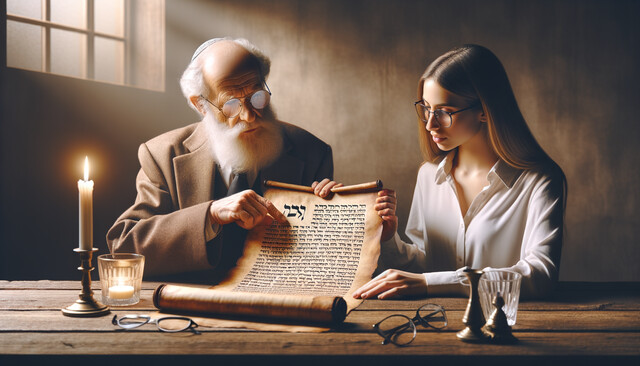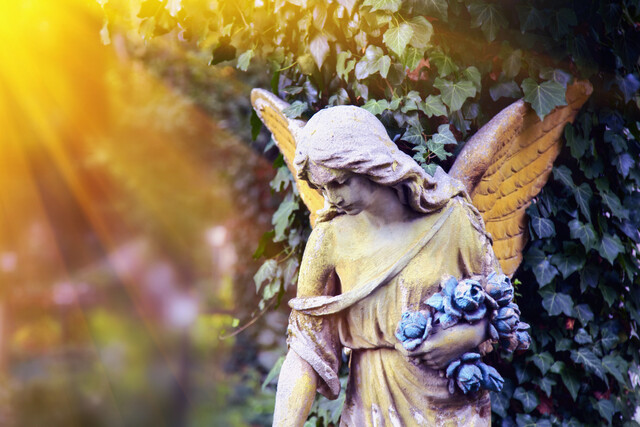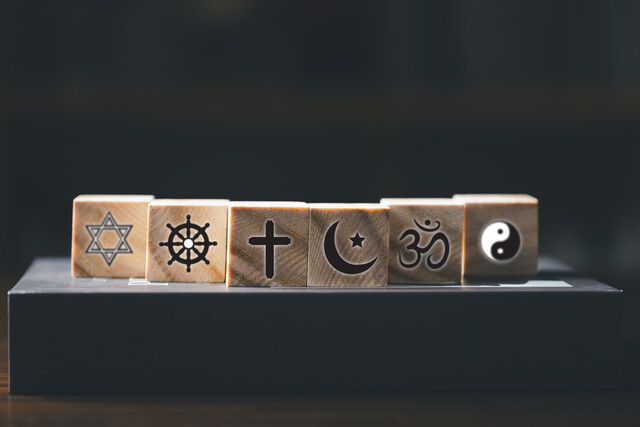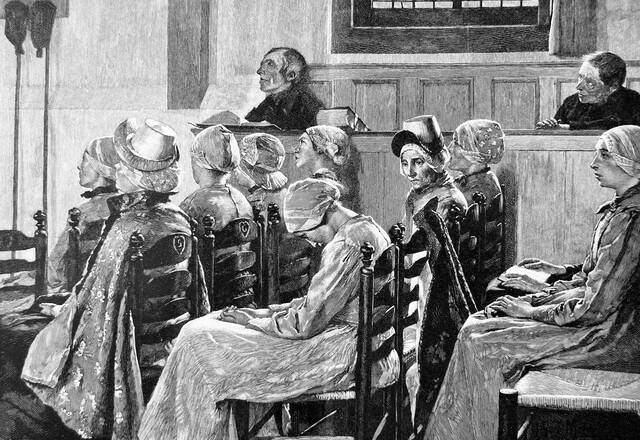Lesson 1. Judaism 101
Jewish places of worship, like synagogues, are central to learning and spiritual practice, reflecting the educational aspect of the faith. The Torah serves as the core guide for ethical conduct, history, and theology, shaping Jewish life for millennia.
Lesson 2. Leaders of the Synagogue
Each religious leader in the synagogue, from rabbis to cantors, is responsible for teaching the faith and helping resolve community disputes through Jewish law and tradition. Their roles often extend beyond religious services, including officiating weddings, leading festivals, and educating community members.
Lesson 3. Understanding Life Milestones in Judaism
From birth to death, Jewish rites of passage like brit milah and bar mitzvah are profound communal affairs. This lesson underscores the integration of religious traditions into life's pivotal points, underlining communal and familial support.
Lesson 4. A Journey Through Jewish Celebrations: Holy Days and Their Significance
Rosh Hashanah signifies the Jewish New Year, marked by reflection, repentance, and symbolic meals to bring in a hopeful year. Culminating in Yom Kippur, the Day of Atonement emphasizes seeking and granting forgiveness, backed by a 25-hour fast and deep synagogue engagement.
Lesson 5. The Heart of a Jewish Home
The Jewish home integrates its religious obligations into everyday life, using symbols like the mezuzah to express faith and devotion. The spirit of shalom bayit promotes peace within families, supported by traditions that recognize equal partnerships in marriage and the integral roles of both husband and wife.
Lesson 6. Clean and Unclean: Defining Foods through Leviticus
Strict guidelines in the Torah guide Jews in eating kosher by defining foods into clean and unclean categories and enforcing humane slaughter methods. Kitchen practices further emphasize the separation of meat and dairy, reflecting a holistic lifestyle beyond just diet.
Lesson 7. Understanding the Foundations of Judaism through Written Laws
The Torah, believed to be divinely revealed to Moses, is central to Judaism and intertwines ethical, legal, and narrative elements. Encompassing both written and oral laws, the Torah is a timeless guide for faithful Jews, emphasizing a continuous journey of learning across generations.
Lesson 8. Foundations of the Oral Laws in Jewish Tradition
Jewish tradition sees the Torah as comprising an eternal written law and a dynamic oral law, both given to Moses at Mount Sinai. The oral law, evolving into the Mishnah and later the Gemara, guides interpretation and application of Jewish laws throughout generations.
Lesson 9. Transitions and Traditions: Jewish Funeral Customs
In Judaism, death is a revered transition involving numerous rituals such as the recitation of a final confession, communal preparation of the deceased, and meticulous funeral protocols. The mourning period spans several phases, each with specific customs that showcase the profound respect and compassion afforded to a departed soul.
Lesson 10. From Genesis to Exodus: The Birth of a People
Genesis tells the vast historical narrative of the Jewish ancestry, from the Creation and Noah's flood to the cultural birthright of Abraham and his descendants. Marking pivotal events and promises, this book sets the foundation for the Jewish faith and their covenant with God.
Lesson 11. Exploring Exodus: The Essential Journey of Faith and Liberation
As the narrative of Exodus unfolds, it delineates both the physical liberation and deep spiritual journey of the Israelites, prompted by years of bondage in Egypt. It introduces fundamental laws and instructions for the tabernacle, reflecting an early structured approach to communal worship and obedience to God.
Lesson 12. Jewish Leaders of Old
Highlighting storied leaders from the Old Testament, this lesson weaves a rich tapestry of conquest, monarchy, and prophecy that define Jewish heritage. It emphasizes the enduring essence of prayer and scriptural teachings that continue to hold relevance in Jewish life today.
Lesson 13. Diving Deep into Jewish Prayer Traditions
Jewish prayers are deeply rooted in tradition and serve to praise, supplicate, and give thanks to God, forming a key part of Jewish life for thousands of years. They naturally blend written laws, rituals, and melodies, with morning, afternoon, and evening prayers shaping daily spiritual practice.
Lesson 14. Angels and Prophets in Jewish Tradition
Jewish mysticism offers a complex blend of beliefs about angels, demons, and the soul, stressing personal interpretation in a faith rich with historical prophets. Kabbalah, often misunderstood as dark magic, embodies tradition that has both intrigued and misled many over centuries, focusing on divine mysteries rather than superstition.
Lesson 15. Prelude to Horror: The Nazi State's Rise and Reach
Escalating anti-Semitic violence erupted with Kristallnacht, leading to mass arrests and deportations to concentration camps, exploding further with Germany's territorial expansions during the war. In the shadows and darkness of human nature, figures like Mengele and Eichmann operationalized horror on unthinkable scales, while heroes like Raoul Wallenberg defied oppressors to save Jews.
Lesson 16. Conflict and Triumph: Israel's Path from 1946 to 1967
In the aftermath of World War II, Jewish displacement led to the establishment of the State of Israel on May 14, 1948, amid ongoing regional tensions and conflict. The new state sought to affirm Jewish cultural and political identity, though it fueled controversies and violent confrontations with Arab neighbors.
Lesson 17. Israel's Struggle for Survival: The Six-Day War Unveiled
Faced with existential threats from neighboring states, Israel launched a swift military campaign, capturing strategic territories and altering the geopolitical landscape. The aftermath of the Six-Day War left the region in a state of unrest, perpetuating a cycle of conflict and fragile peace talks.
Lesson 18. Great Minds, Great Impacts
Cultural icons like Hank Greenberg showcased the intersection of sport and identity, breaking barriers in American baseball despite rampant antisemitism. His adherence to Jewish traditions amidst professional duties exemplified resilience and pride.
Lesson 19. Zion and the Jewish Diaspora: A Changing Connection
Judaism, deeply rooted in millennia of history, has demonstrated resilience and unity, particularly following the Holocaust, and continues to prioritize social justice and ethical teachings alongside maintaining cultural identity in the modern age. Women have progressively acquired religious roles once restricted to men, marking significant advancements in gender equality within the faith.

16 Hours average completion time
1.6 CEUs
19 Lessons
37 Exams & Assignments
17 Discussions
19 Videos
20 Reference Files
Mobile Friendly
Last Updated December 2025









